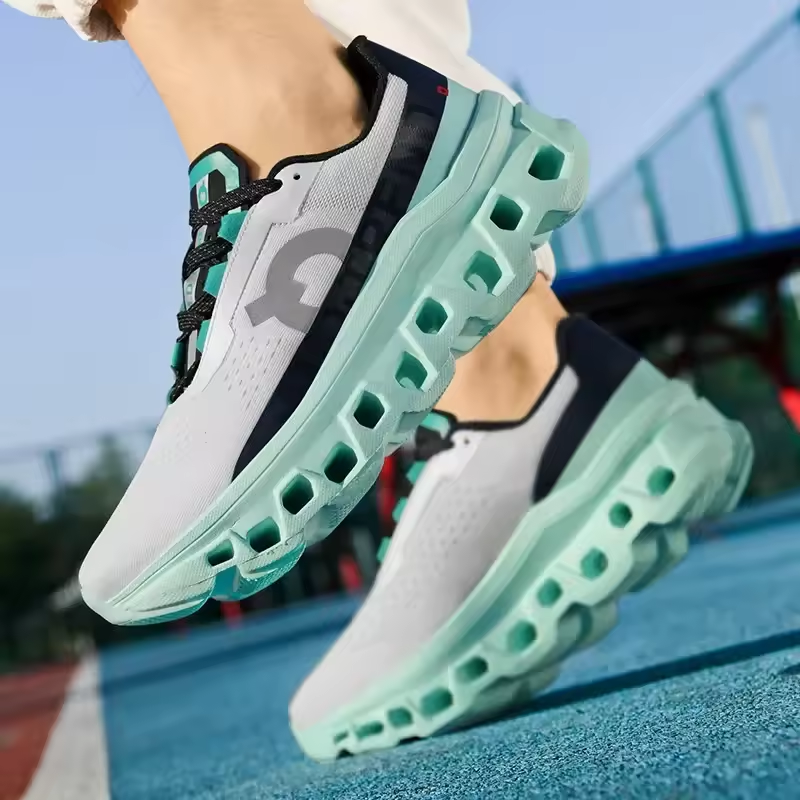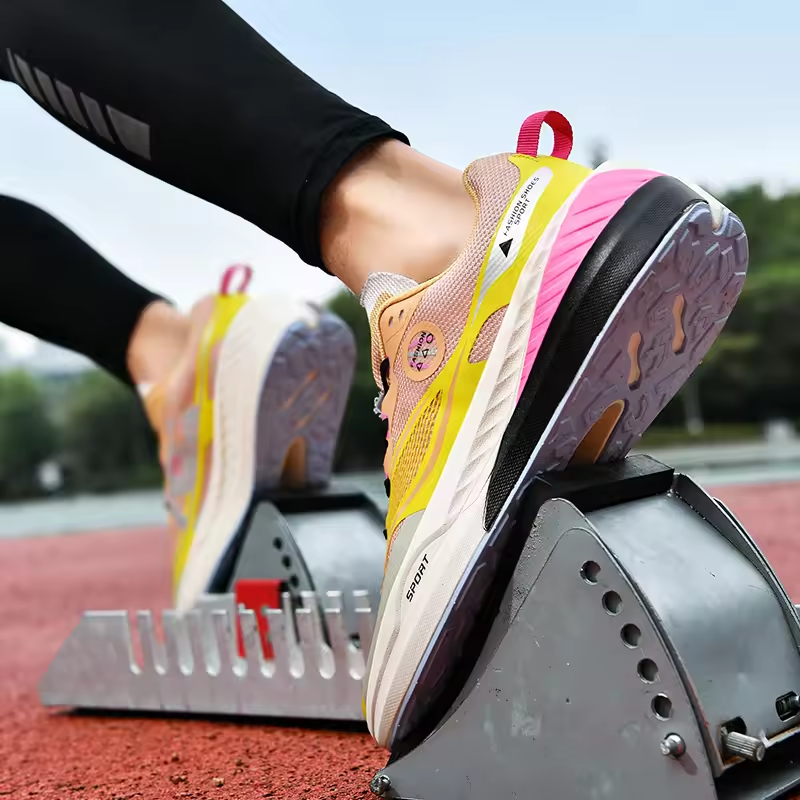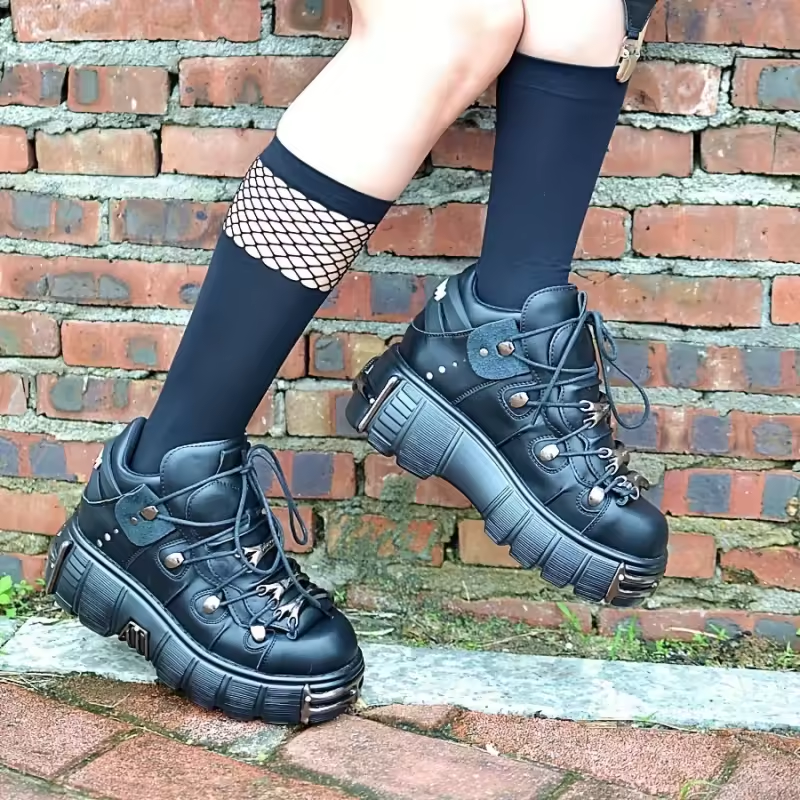The Importance of Choosing the Right Running Shoes for Overweight Men
Selecting the right running shoes is critical, especially for overweight men. The added weight puts extra stress on the feet and joints, making the right type of shoe essential for both comfort and injury prevention. Shoes that don’t provide adequate support and cushioning can lead to a host of problems, such as increased joint pain, overpronation, and exacerbated plantar fasciitis.
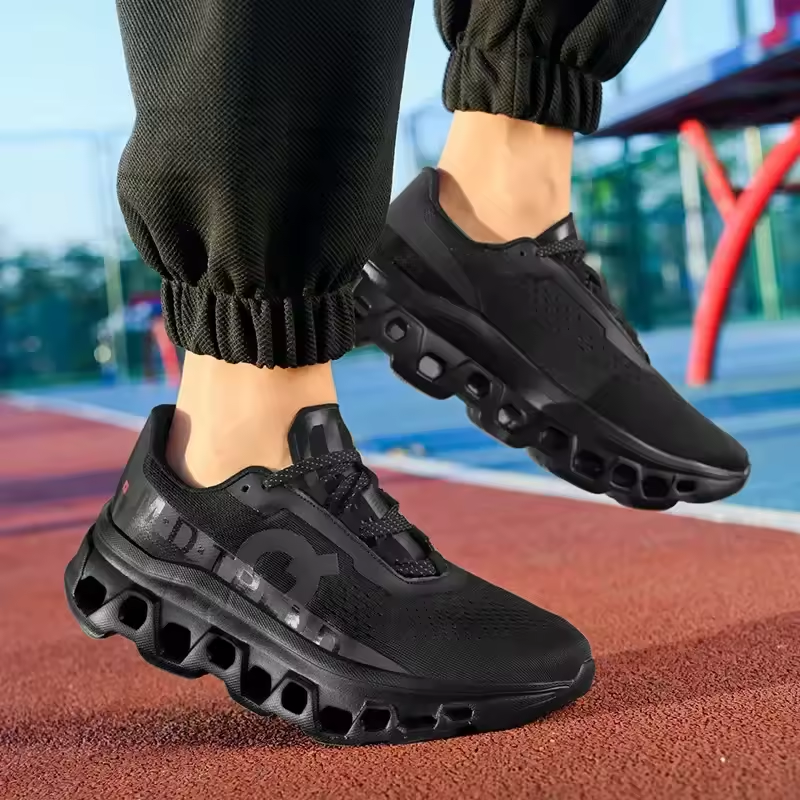
Here are key reasons why the choice of running shoes is so important for overweight runners:
- Proper Support: Overweight men need shoes that offer robust support to maintain proper foot alignment and reduce strain on the lower body.
- Enhanced Cushioning: Extra cushioning helps absorb the impact each time your foot hits the ground, thereby protecting your joints.
- Durability: The best running shoes for overweight men should be durable to withstand the additional wear and tear that comes with a higher body weight.
- Injury Prevention: With the right shoes, the chances of common runner’s injuries decrease, allowing for a safer and more enjoyable running experience.
- Better Performance: Comfortable and well-fitting shoes can improve running efficiency for overweight men, translating to better performance and more enjoyable workouts.
It’s not just about the immediate comfort—choosing the right shoes is an investment in long-term health and fitness goals. For overweight men, the best running shoes will help facilitate regular exercise, leading to potential weight loss and improved overall well-being.
Key Features to Look for in Running Shoes for Overweight Runners
When shopping for the best running shoes for overweight men, certain features should be at the top of your list to ensure maximum comfort and support. Here’s what to look out for:
- Ample Midsole Cushioning: A thick, soft midsole provides the necessary cushioning. It absorbs hard impacts and reduces stress on your joints.
- Sturdy Support: Look for shoes with good arch support and a firm heel counter. They help to stabilize your feet and prevent excessive inward rolling, known as overpronation.
- Wide and Deep Toe Box: Extra space in the toe area offers better accommodation for your feet. It prevents blisters and promotes better toe splay.
- High-Density Foam: Denser foam materials in the midsole ensure that the shoes do not compress too quickly. They cater to the extra weight and prolong the shoe’s life.
- Durable Outsoles: Outsoles made with rugged materials resist wear. They are essential for better traction and longevity.
- Breathable Uppers: Shoes with mesh or other breathable materials keep your feet cool and dry. They minimize the risk of fungal infections from excessive sweating.
- Non-Slip Design: Non-slip features are vital for both indoor and outdoor running safety.
Remember, the best running shoes for overweight men combine these features to deliver a stable, supportive, and lasting running experience. Investing in a high-quality pair can be the difference between a painful run and a comfortable one that furthers your health and fitness goals.
Top Picks: The Best Running Shoes for Overweight Men in 2025
When it comes to finding the best running shoes for overweight men in 2025, it is essential to prioritize comfort, durability, and adequate support. As someone who understands the challenges of running with a heavier build, I have combed through numerous options to compile a list of top-notch shoes that will cater to your needs. Here are my suggestions:
- Solid Cushioning: Look for shoes with premium, thick cushioning. This will help absorb the impact and protect your joints.
- Robust Arch Support: Choose shoes with strong arch support. This feature helps reduce overpronation.
- Spacious Toe Box: A shoe with a roomy toe box allows for natural movement and avoids blisters.
- High-quality Materials: Opt for shoes with materials that resist quick wear and offer longevity.
- Excellent Traction: Shoes with superior outsole grip enhance safety and performance.
- Breathable Design: Seek out shoes with good ventilation. This keeps feet cool and reduces sweat-related issues.
By focusing on these features and acknowledging user reviews, I’ve singled out a few top contenders for the best running shoes for overweight men in 2025. It is important to test them out before purchasing to ensure they suit your specific needs. With the right pair, your running sessions will be more comfortable, your performance may improve, and you can actively work towards better health outcomes.
Understanding the Role of Cushioning and Support
When searching for the best running shoes for overweight men, understanding the role of cushioning and support is crucial. Good cushioning reduces the force of impact when your foot strikes the ground. This lessens stress on joints. Support helps keep the foot in a stable position to prevent injury.
Cushioning acts like a shock absorber for your body. Each step generates a shock that travels up your leg. Without enough cushion, that shock can strain your knees and hips. Thick, soft midsoles are a must. They act as a buffer against hard surfaces.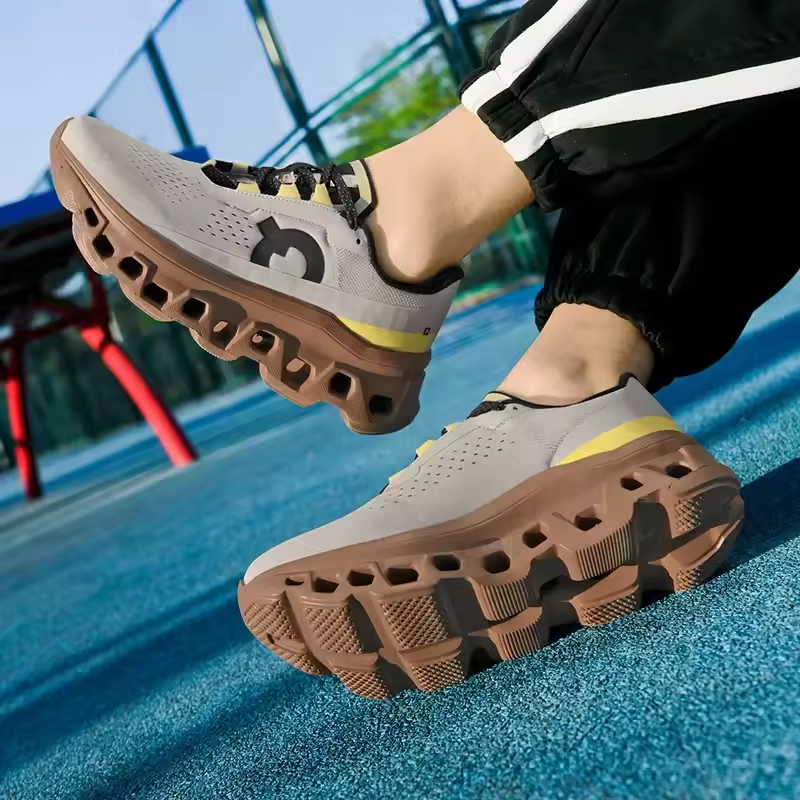
Support is about control. It ensures your foot lands properly. A shoe with poor support might allow your foot to roll too much, leading to pain. Arch support and heel counters aid in this. They control overpronation and maintain foot alignment.
Together, these factors make sure that each run is safe and comfortable. They prevent the common issues that overweight runners face. Remember, a good balance of cushioning and support will improve your running experience. It might also help you avoid injuries that could derail your fitness journey.
The Relationship Between Weight and Shoe Durability
The durability of running shoes often correlates with the runner’s weight. Heavier runners exert more stress on their footwear, which can lead to quicker degradation of the materials. Therefore, it’s important for overweight men to understand how their weight impacts the longevity of their running shoes, and what features can extend their lifespan.
Here’s how weight impacts shoe durability:
- Stress on Materials: Additional weight increases the stress on the midsoles, outsoles, and upper materials of the shoes.
- Compression: Over time, this stress can compress materials like foam, reducing their ability to absorb shock effectively.
- Wear and Tear: Denser midsoles and reinforced outsoles often see less wear and tear, as they’re designed to stand up to the added weight.
It’s important when seeking the best running shoes for overweight men to consider these durability factors. Shoes specially designed for higher weights often feature technology and materials catered to withstand extra pressure. This includes advanced cushioning systems and more robust outsole designs.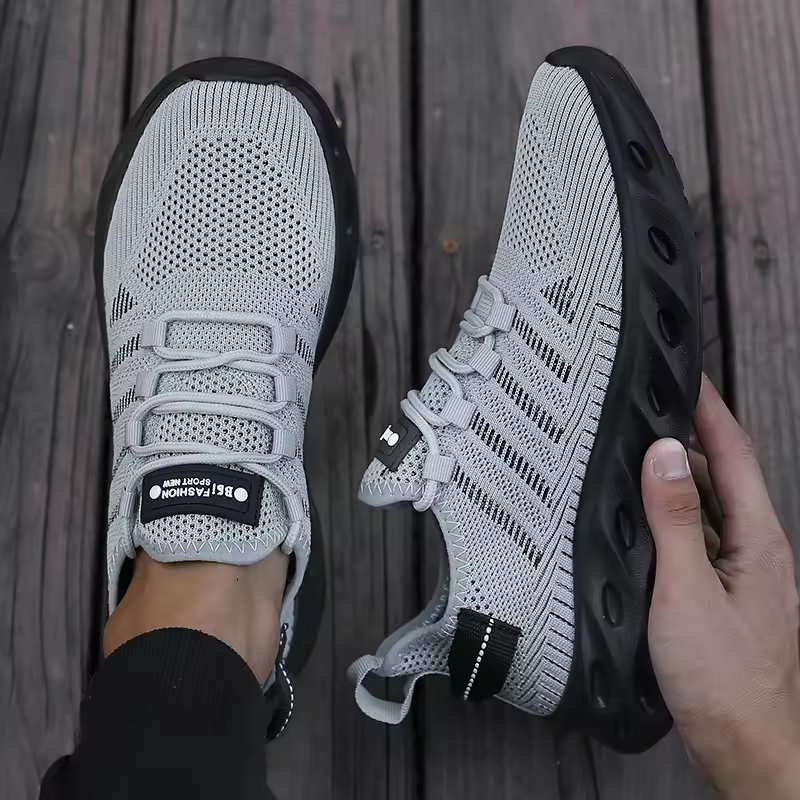
In summary, overweight runners should aim for shoes with:
- Reinforced Construction: Stronger materials that offer better resistance to weight-induced wear.
- Enhanced Cushioning Technology: To ensure lasting shock absorption and comfort.
- Thick, Durable Outsoles: For prolonged usage without quick deterioration.
Choosing a pair with these considerations in mind will not only provide comfort and support but also ensure that the shoes remain functional over a longer period, despite the added stress of a heavier weight.
How Fit and Sizing Affect Running Comfort and Performance
The fit and sizing of running shoes can make or break your running experience, especially for overweight men. Too tight, and you risk blisters, numbness, and general discomfort. Too loose, and you might face a lack of stability, increasing the risk of injury. It’s essential to get these aspects right to maximize comfort and enhance performance.
Here’s a breakdown of how proper fit and sizing influence your running:
- Snug Heel: Your shoe should fit snugly around the heel to prevent slippage which can cause blisters.
- Adequate Room: There should be roughly a thumb’s width between your longest toe and the shoe’s end to ensure enough room for foot expansion during runs.
- Flex Point: The shoe should bend where your foot naturally flexes, reducing strain on the arch and improving comfort.
- Secure Midfoot: A properly fitted shoe will have a secure, not tight, midfoot to avoid overpronation and support the arch.
- Correct Width: Shoes should match the width of your foot to prevent excessive pressure points or too much movement inside the shoe.
When it comes to performance, the right fit can markedly increase efficiency. Properly sized shoes allow for optimal power transfer and minimize energy loss. They help in maintaining a better running posture and gait. This can lead to improved running technique and reduced fatigue over time.
It is recommended to try on running shoes later in the day when your feet are at their largest due to natural swelling. Don’t forget to wear the same socks you plan to run in when trying on new shoes, as this can affect the fit.
For overweight men, it’s not just about the shoe being durable; the right fit is a crucial element that will ensure the best running shoes for overweight men facilitate a comfortable and powerful running stride.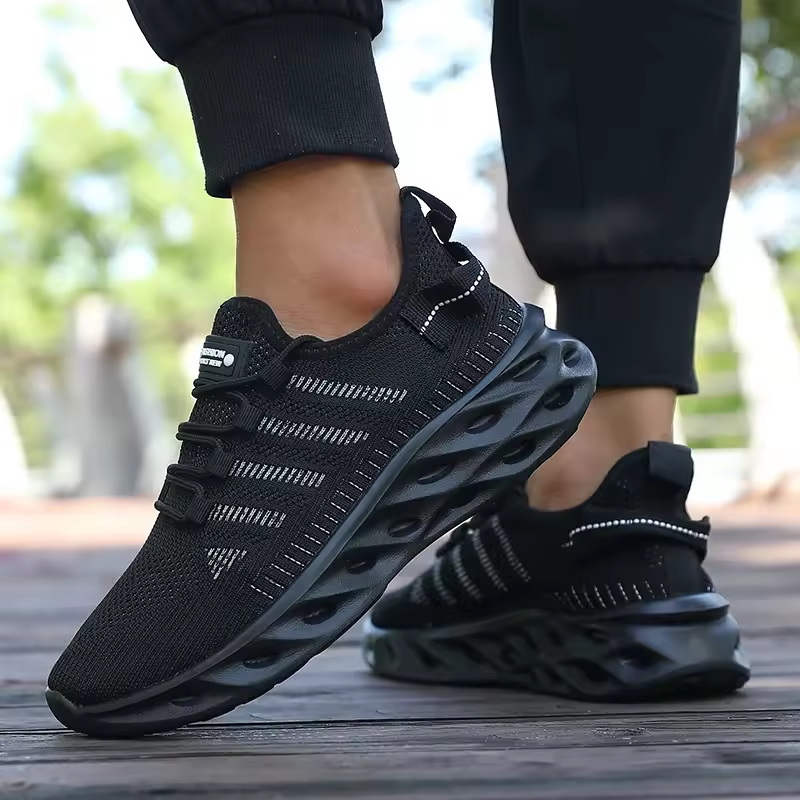
Tips for Maintaining and Extending the Life of Your Running Shoes
Looking after your running shoes is essential, especially when they are designed for extra support due to being an overweight runner. A well-maintained pair not only feels better but also helps prevent injuries from worn-out support or cushioning. Here are practical tips for keeping your running shoes in top shape:
- Keep Them Clean: Dirt and grime can wear down materials. Clean your shoes gently with a brush or cloth.
- Dry Responsibly: Never put running shoes in a dryer. Excess heat damages the structure. Let them air dry away from direct sunlight.
- Rotate Pairs: Using two pairs of shoes can let each one rest and return to its proper shape between runs.
- Wear Them for Running Only: Use your running shoes solely for running to avoid unnecessary wear from other activities.
- Store Correctly: Keep them in a cool, dry place to prevent materials from breaking down.
- Use Proper Technique: Running form matters. Poor technique can put unequal pressure on shoes, leading them to wear out unevenly.
- Monitor Mileage: Track how many miles you run in each pair. Most shoes last 300-500 miles before they need replacing.
- Lace Up Properly: Tying your shoes too tightly can stress the material, while too loose a fit can cause uneven wear.
These simple actions can add miles to your running shoes’ life, ensuring that the best running shoes for overweight men deliver comfort, support, and durability run after run. By taking care of your shoes, you’re also taking care of your feet and your overall health.
Addressing Common Concerns: Heel Pain, Overpronation, and Plantar Fasciitis
Overweight men often face specific issues when running, such as heel pain, overpronation, and plantar fasciitis. To address these concerns, the best running shoes for overweight men should include certain features designed to alleviate these conditions.
For heel pain, shoes with extra heel cushioning and a supportive heel cup are key. This padding reduces impact, while the cup holds the heel in position.
Overpronation is when feet roll inward too much. Stability shoes can help. They have structured designs that control foot movement and improve alignment.
Plantar fasciitis causes arch pain. Good arch support in running shoes is vital. It supports the arch and can prevent the plantar fascia from overstretching.
To sum up, the best running shoes for overweight men will have targeted support. This helps tackle specific foot problems common among heavier runners. It’s not just about protection; it’s about enabling pain-free and efficient runs.
Remember to always consult a specialist if pain persists. They can offer advice tailored to your particular needs. And, never underestimate the value of a proper warm-up and stretch routine prior to running. It can contribute significantly to preventing these common concerns.
